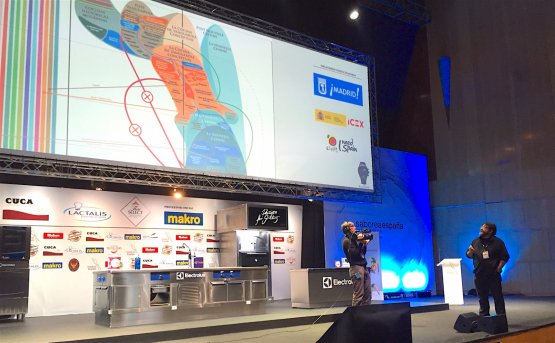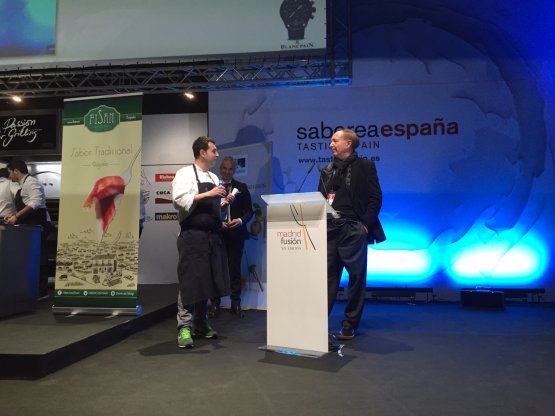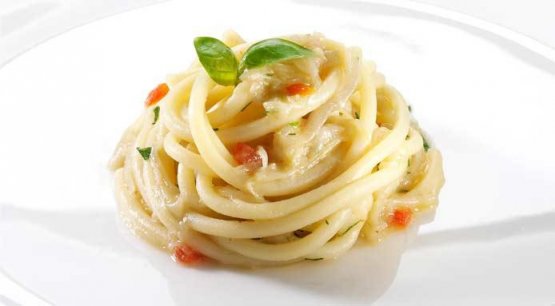When a congress illustrates “the language of post-avantgarde” you first need to consider the conceptual issue, especially so if the festival is not dedicated to art but to gastronomy. Hence at Madrid Fusión the initial step was exactly this: what are the rules of the alleged cuisine of the future, of the post-avantgarde? The answer arrived in practice from those who, more than others, are considered the forerunners of this new-born trend, that is to say Ricard Camarena, David Muñoz, and Joan Roca himself; conceptually, instead, it arrived from the person indicated in the presentation of the Spanish congress as the “pensador culinario” [culinary thinker], “genio oculto en la trastienda de la alta cocina”[the hidden genius in the back room of high cuisine], “druida culinario” [the culinary druid].

Quico Sosa during his speech in Madrid
As we recently wrote,
Quico Sosa – we’re speaking of him – graduated in Philosophy in Bologna, so he knows how to put his thoughts in order. Including those regarding cooking. We earlier spoke about “categorization” when facing post-avantgarde. In fact
Sosa indicated in Madrid that a main characteristic in this trend is that it lacks strict rules, it is a sort of “fusion vision” compared to previous schools. The modernity that’s about to come will be an integration of the recent past (the avantgarde) and the more remote one (
nouvelle cuisine).
Sosa thus explained, when presenting the “post-avantgarde manifesto” on which we will return: «Let’s start by saying that everything in fine dining is based on products, always: the dichotomy with technique is only illusory. If we consider nouvelle cuisine, however, it indeed represented a stronger attention to raw materials, seasonality, pure flavours, it made sauces lighter and so on. Avantgarde did something different: it took products and stylised them, territory was included, but it was interpreted allegorically, thanks to technique».
Post-avantgarde it’s like a summary of the two previous currents: it once again focuses on product and territory, without changing its basic nature (in terms of texture or whatever) too much, but working with it using the technical and conceptual heritage of the last upturned twenty years.

Ricard Camarena with culinary critic José Carlos Capel
? Yes, in a way, «but with new elements: a return to raw diet, a passion for ancestral food, think of raw, fermented food and broths. Moreover, it includes in its vision of territory that of its culture and even its social relations – the movement born thanks to
Gastón Acurio in Peru comes to mind. We could say therefore that territory-product becomes territory-culture. The post-avantgarde includes strong flavours, lots of salivation... A pork baked in the oven at low temperature and for many hours and well plated in a fine dining restaurant means product, science, with the lesson that came for the aesthetic radicalization of the dish, of which
Ferran Adrià was the biggest representative, plus a new element, which recalls history, roots. This is the fragile balance we’re experiencing».
So in the same way as not everyone was Bocuse or Marchesi in the days of nouvelle cuisine, nor Adrià or Blumenthal with avantgarde, the new current perfectly coexists with those who ignore it or linger on a déjà vu. In fact, more than that: as we mentioned, post-avantgarde – given it is an almost “moderate” summary, tolerant of other currents – postulates a peaceful coexistence. «We need to relativize models [instead of creating string categorizations, that is]. Few chefs belong to a movement in a rigorous way. Boundaries are usually fluid, and this time more than ever. The menu of a post-avantgarde restaurant can gradually include all schools, respecting the intimate nature of the one it feels it belongs to, in modernity. We used to have a dish, then we broke it apart, now we reinstate it»: this process, however, can even take place, for instance, within the same tasting menu.

Pasta with shallot and chilli pepper, a classic at Il Luogo di Aimo e Nadia
At the end of the lesson, we ask
Sosa where does Italy stand in this trend: «It affects all of Europe, in Italy post-avantgarde is even easier because, how can I put it, you experienced some difficulties with avantgarde, it had to face many problems. You’re much more ready for a model that recuperates product, territory, culture in a more pedagogical way, as these are your strong points. Think of
Il Luogo di Aimo e Nadia for instance: there was never a time when you couldn’t have an excellent pasta dish there!».
Sosa had already replied to the legitimate doubt that this intellectualisation of cooking doesn’t always find suitable creators (that is to say chefs), sniggering: «For sure, it is today expected from chefs to be more prepared. Yet I don’t want to elude the question and reply with another one when asking: which one is better, an intellectual or an intuitive poet? I say: it depends on the outcome. It’s the same with cuisine: we had intellectual-chefs who created theories and avantgarde and it’s clear that fine dining needs to be connected with cultural, intellectual and artistic elements. This, however, cannot be transformed into an obsession, a disease: in the end, we always need to deal with the supreme judge». In this case, luckily, the palate.